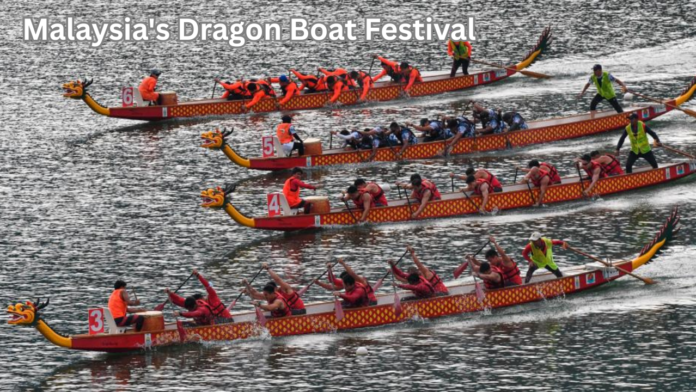The Dragon Boat Festival in Malaysia is an energy-packed event that brings together cultural heritage, competitive sports, and community spirit. Originally based on ancient Chinese traditions, the festival has evolved into a multicultural celebration in Malaysia, drawing devotees and spectators alike from all over the world. This article discusses the historical origins, cultural significance, and how the festival is celebrated in contemporary Malaysia.
The Historical Origins of the Dragon Boat Festival
Ancient Chinese Roots
The Duanwu Festival, or Dragon Boat Festival, has a history of over 2,000 years in China. It is observed on the fifth day of the fifth lunar month, which typically falls in June. The festival is closely associated with the legend of Qu Yuan, a patriotic poet and minister of the Warring States period. Qu Yuan, in despair over political corruption and exile, committed suicide by drowning himself in the Miluo River. Local villagers leaped into boats to rescue him, tossing rice into the water to prevent evil spirits from consuming his body. This act is believed to be the origin of dragon boat racing and the tradition of eating zongzi (sticky rice dumplings) on this day.
How the Festival Came to Malaysia
The Dragon Boat Festival became an important part of Malaysia’s cultural landscape with the migration of Chinese people throughout the 19th and early 20th centuries. Over time, Malaysians from all walks of life embraced the festival, and it evolved into a large sporting and cultural affair. Today, Malaysia celebrates the Dragon Boat Festival with great enthusiasm, particularly in states with a strong Chinese heritage, such as Penang, Malacca, and Sabah.
The Significance of Malaysia’s Dragon Boat Festival
Promoting Cultural Heritage
The festival connects ancient customs with contemporary celebrations. It helps preserve the rich traditions of Malaysia’s Chinese diaspora while facilitating cross-cultural appreciation. Malaysia boasts a multicultural identity, with diverse ethnic groups actively participating in the festival.
Uniting Communities
The sport of dragon boat racing symbolizes unity and teamwork. Crews consist of rowers, drummers, and steersmen who must row in perfect unison, propelling their long, colorful boats toward victory. This teamwork extends beyond the race itself, reinforcing the festival’s broader theme of community harmony.
Spiritual and Symbolic Significance
Beyond the competition, the Dragon Boat Festival holds spiritual significance in Malaysia. Many believe the festival wards off bad luck and attracts prosperity. In Chinese mythology, the dragon is a powerful symbol representing strength, courage, and protection from evil.
Highlights of Malaysia’s Dragon Boat Festival
Spectacular Dragon Boat Races
The festival’s main attraction is the thrilling dragon boat races. These races bring together teams from across Malaysia and the world to test their endurance and skill. Some of the most renowned race venues include:
- Penang, Teluk Bahang Dam – Home to the Penang International Dragon Boat Festival, one of the most prestigious races in the region.
- Putrajaya Lake – Host to national and international dragon boat championships.
- Sabah, Kota Kinabalu – A breathtaking location where culture meets competitive speed.
Traditional Delicacies
No festival is complete without traditional food, and Malaysia’s Dragon Boat Festival is no exception. The most famous delicacy is zongzi, sticky rice dumplings wrapped in bamboo leaves. These dumplings come in a variety of flavors, both sweet and savory. Popular variations include:
- Nyonya zongzi – A Peranakan twist infused with distinctive spices.
- Hainanese zongzi – Featuring marinated pork, salted egg yolks, and mushrooms.
- Malay and Indian-inspired versions – Flavored with local ingredients such as pandan and coconut.
Cultural Performances and Activities
The festival is more than just boat racing—it also includes traditional lion and dragon dances, martial arts exhibitions, and Chinese opera performances. Visitors can participate in calligraphy workshops, lantern-making, and storytelling sessions about Qu Yuan and the festival’s historical significance.
The Modern Evolution of the Festival in Malaysia
A Global Sporting Event
Although the festival’s origins are deeply rooted in Chinese folklore, dragon boat racing has evolved into an international sport. Malaysia has embraced this competitive spirit by hosting international tournaments featuring top teams from around the world. As a result, dragon boat training has become a year-round activity in Malaysia, cementing its status as a key part of the country’s water sports scene.
Tourism and Economic Impact
The festival significantly boosts Malaysia’s tourism industry. Cities such as Penang and Putrajaya attract large crowds of visitors, benefiting local businesses, hotels, and food vendors. Additionally, the event provides a platform for local artisans to showcase their crafts, further enhancing Malaysia’s cultural tourism appeal.
Environmental Awareness Initiatives
In recent years, sustainability has become a major focus of the festival. Organizers have implemented eco-friendly measures, including reducing plastic waste, promoting water conservation, and supporting marine protection initiatives. These efforts reflect Malaysia’s commitment to preserving its natural beauty while hosting world-class events.
The Dragon Boat Festival in Malaysia is a vibrant celebration that honors ancient traditions while embracing modern sporting excellence. From its legendary origins tied to Qu Yuan to its role in fostering unity and tourism, the festival remains a vital part of Malaysia’s cultural heritage. Whether experienced as a thrilling sporting event or a culturally significant occasion, the festival continues to bring people together, proving that its impact is as enduring as the rhythmic beating of the dragon boat drums.

